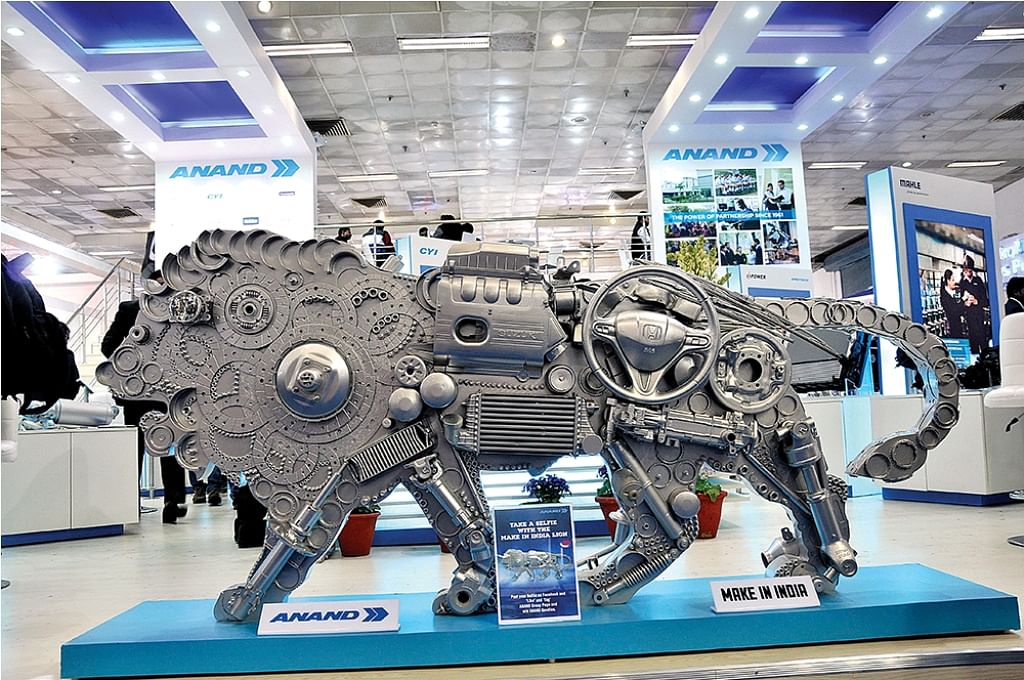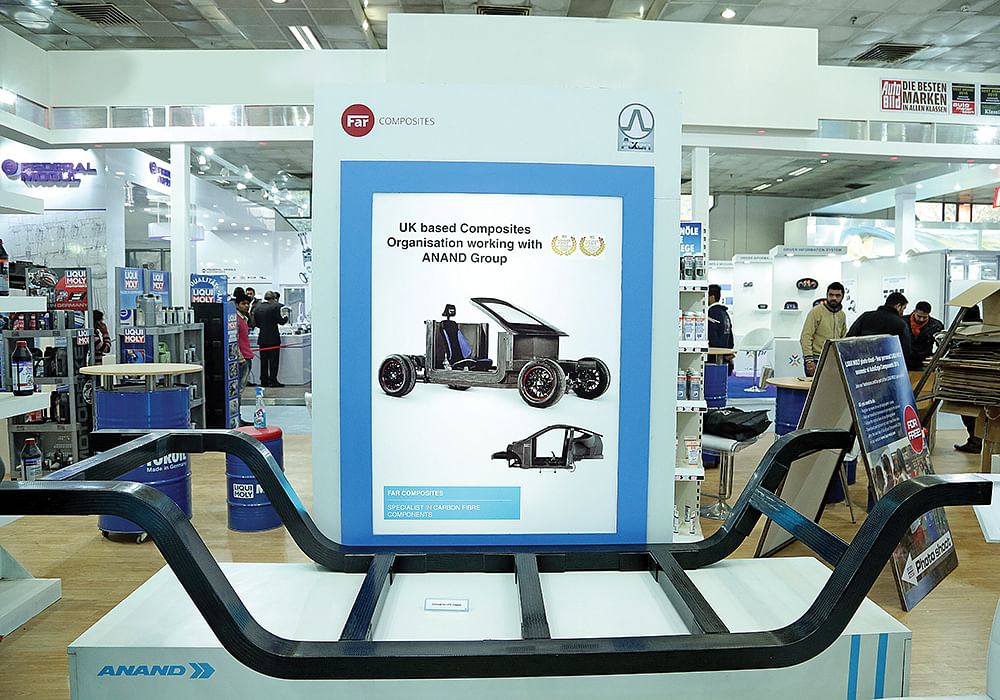Anand Group's Deepak Chopra: ‘We plan to invest around Rs 500 crore in ABS and ESC.’
Anand Group’s CEO shares his views on the megatrends of electrification, safety, autonomous, connected technology and all the future investment strategies.
The Rs 9,000 crore Anand Group is scripting new strategies to grow sustainably in the automotive world which is witnessing changes like never before. The Group's CEO Deepak Chopra gives his insight on how the large organisation is preparing for new industry megatrends, particularly vehicle electrification which is leading the pace.
The global automotive world is witnessing the megatrends of electrification, safety, autonomous and connected. How much of these four do you think will impact Indian industry?
I personally feel that you can’t wish them away. They are definitely there, whether in terms of regulation which is tightening, on emissions, safety and other things, or more and more comfort which is required, whether it is in terms of connected or autonomous vehicles. EV and hybrids are a reality – they are happening all around the world. The only thing which is still not clear is at what pace this technology will happen. Certainly, there are many competing technologies.
So, as far as the Anand Group is concerned, we don’t want to miss the bus. We want to be very much part of it. We know it is real, it's going to come. Sometimes, certain steps may happen where the costs, let's say battery costs, may come down and in turn, the cost of products may reduce, which means the adoption rate will certainly improve.
We are very well positioned because many of our overseas partners have got strong partners. Many of them are already working on a lot of e-mobility products and many advanced technologies relating to active safety and autonomous vehicles. We have got the opportunity to partner with them. With the evolution of those technologies in India, we are very well placed to get them here and as the volumes become reasonable, we will be able to start manufacturing locally. However, even if some OEMs want us to import and supply when the volumes are small, we can do that too.
We are also looking to, independently, form new partnerships with new partners for some technologies which may not be within the fold of our existent partners. For instance, carbon composite-based lightweighting technology. We have an MoU with the company and are going to convert into a JV very soon. But I think we may have to wait for sometime because the actual real commercial usage of that will happen later. We will have to work with OEMs to convince them that carbon composites are not meant to be used only in the aircraft industry. We have to find a way to manufacture them in a cost-effective manner. They would certainly be more expensive than the conventional material, but the benefits (value-cost proposition) should very much outweigh costs.

The Anand Group, which is among India’s leading manufacturers and suppliers of automotive systems and components, has 23 global alliances and 19 companies under its umbrella.
We have set up an automotive growth council within the Anand Group to explore new opportunities. Sunil Kaul, one of the executive committee members, heads that and we are going to be very proactively working on this particular area and find opportunities with our existing partners as well as with either new partners or on a technology-license basis, whatever is there. It's a world of collaboration now and our forte has been partnerships. So, to that extent, I feel we are very well placed.
Do you think some of your businesses may get redundant because of this entire shift?
Yes, certain businesses eventually will go off. Let’s say the typical IC engine will go off, but I don’t see that happening very fast because hybrids will certainly remain much more popular. And even the IC engine itself. Our partners are still working on making some of these engines much more efficient and you can use synthetic fuel and bio-fuels with very efficient engines. Even this will be a very competing technology to EVs because you have to ultimately see what the purpose is – what is the total carbon footprint which you can reduce.
The focus is to achieve the end through any means.
The means per se is not electric. Electric vehicles are getting most of their power from conventional sources of electricity (then the well-to-wheel mantra doesn’t add up positively). So I don’t feel that IC engines will go away very fast, but certainly, more and more EVs and hybrids will come in and hybrids will still be much more popular. It is a good option to travel for longer distances and again they are still reasonably now cost-effective. The incremental cost is not so high as compared to pure EVs right now but maybe at some point of time, EVs will also become affordable.
In India, I see it (vehicle electrification) taking even longer in spite of the government’s focus on that. By 2030, if we are going to have 8-10 million passenger vehicles on the road (SIAM's white paper also talks about 30 percent of them being electric), the government can’t subsidise that. It has to stand on its own feet and that is some time away.
But apart from EVs and hybrids, there are autonomous vehicles and people talk whether complete autonomous vehicles will come in. Maybe it will take much longer time because of Indian road conditions and driving habits but I think there will be limited autonomous features. Basic features for autonomous vehicles are already there but they will start getting more and more advanced. We are talking about all these emerging technologies and as regards BS-VI, we are already in the process of making those investments.
How many new JVs or new partnerships are you looking at, over the next year or two?
It is very difficult to say. We have already, with our existing partner (Mando), started manufacturing electronic brake systems, ABS and Electronic Stability Control (ESC). ABS is already being fitted right now and now we are going to be locally manufacturing ESC. While ABS has been there for some time, ESC adoption is a little bit slow (in India).
I think electric mobility will also drive demand for composites because lightweighting is becoming more of a sensitive issue now. For instance, our chemical products in Henkel Anand. They have a lot of products which can really reduce NVH (noise, vibration and harshness) very substantially. In EVs, it is going to be even more important since engine noise will not be there, any other type of noise or vibration will get really heightened. A number of OEMs have shown interest in our NVH-related products, so these are part of our existing portfolio. We are in an advanced stage of discussions with our existing partners to see if some of the advanced technologies on EVs, connected cars or active safety can be even brought here, even if a little bit ahead of time.

Anand Group believes that carbon composites have a future in automotive applications and not just in the aircraft industry.
We are not shying away from investing ahead of time and are waiting for the business to come in. Like lightweighting. We have to demonstrate to the customer, who has to start believing that it's possible. So we are conducting workshops and are going to invest in that to demonstrate how we manufacture those products. But apart from that, we will also look at new opportunities, even with existing partners or a new JV with them. Similarly with any new partner, like on the lightweighting side, it could be a completely new movement. It is very difficult to say how many. It is not something we clearly know; we are still exploring right now.
You must have earmarked some investment for such projects. How much is that?
That is not an issue. Nothing’s earmarked. Investment would be starting small in many cases. But let’s take the case of ABS and ESC. We are going to be investing just on that product line alone, in three phases, close to around Rs 500 crore in one company – Mando India. We have got a large debt capacity because our debt levels are very, very low right now. Practically zero. In many companies, it is zero debt level. The ability to invest money is not an issue. It only depends that these investments will happen in a phased manner, if they are with the existing partners, may be our existing JV vehicles, they have got surplus money and debt capacities to invest. We have enough capacity to invest in our existing JVs. Our normal expenditure itself at the Group level annually is close to around Rs 500 crore.
Any plan of getting into the same for two-wheelers? Technology adoption is increasing in that space.
Not ABS right now. We will see that in time. On the two-wheeler side, our presence is not that particularly strong. Gabriel is the main company which really deals with our two-wheeler products and has advanced technologies on the two-wheeler suspension side. Apart from manufacturing that, we are also doing a lot of trading of two-wheeler products.
One opportunity could be for instance in the lightweighting side. We have reduced the weight of a complete three-wheeler chassis from 40kg in a steel structure to only 9kg! So the new technologies may throw up opportunities which could be equally applicable. On the ABS side, Mando is not into two-wheelers, but maybe we can explore that if there is a regulation and see whether we can adopt that or go to somebody else who is into this.
(This interview was published in Autocar Professional's April 1, 2018 issue)
RELATED ARTICLES
"Connectivity and ADAS will drive the next wave of disruption": Sundar Ganpathi
Tata Elxsi's CTO Sundar Ganapathi on how connectivity, ADAS, and data will define the next wave of automotive disruption...
INTERVIEW- Renault CEO Cambolive: 'India Is Renault' — Targets 3–5% Market Share by 2030
Renault is pursuing a fundamental reset of its India strategy, says brand CEO and Chief Growth Officer Fabrice Cambolive...
INTERVIEW: "EV Demand is Rebounding both in India and Around the Globe" - JLR's Rajan Amba
Jaguar Land Rover India MD Rajan Amba discusses the India–UK FTA, the company’s manufacturing plans, the upcoming Panapa...






 21 Apr 2018
21 Apr 2018
 12028 Views
12028 Views





 Darshan Nakhwa
Darshan Nakhwa


 Hormazd Sorabjee
Hormazd Sorabjee

 Prerna Lidhoo
Prerna Lidhoo

